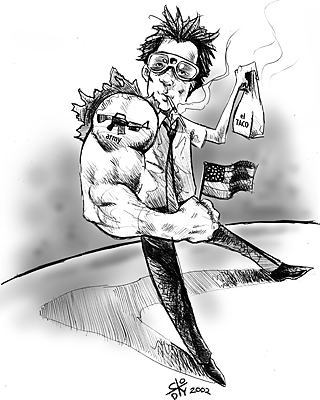
Illustration by Cody Angell
|
By David Caretto
Arizona Daily Wildcat
Monday December 7, 2002
Guest Columnist
ZURICH, Switzerland ÷ While studying here, I've asked some friends about the common stereotype of Americans. My friend Chris sums it up as, "Fat and lazy, sitting on the couch with the remote on their lap, a bag of potato chips in one hand, and the other hand in their pants, like Al Bundy."
The television and Hollywood stereotypes continue. Dr. Baat, a neurosurgeon from Cairo and my neighbor in the dorm, says that Egyptians have a good impression of American culture from the many causal sex scenes shown in movies and dated TV shows such as "Dallas" and "Knots Landing." German medical students have asked me if high school was like "Clueless" and ÷ my favorite ÷ if "American Pie" accurately portrayed every American male teenage existence. I had to reply an honest "no" to both questions.
My other friend, Annette, explains that Europeans feel that Americans look at their continent as a big "American Playground," without appreciating the culture outside tourist traps. I've witnessed this idea. During the Zurich street parade, Europe's second largest techno party, I met some middle-aged men from Tennessee who loudly claimed to everyone in earshot that since they were vegetarians, they wondered if anyone could provide or direct them to "shrooms."
A more telling example was at a train station in Spain. Two American college girls were complaining that their "home-stay moms just couldn't make good ÎMexican food,'" and "Forget Spain · what I wouldn't give for a bag of Chalupas from Taco Bell!" They were taking Spanish courses, but reassured me it was just a ruse to visit Ibiza. Aside from stereotypes, I have found that the United States is globally respected and seen in three
interchangeable forms. First, the United States is seen as the great experiment in multiculturalism and democracy that has yet to fail. Dr. Distler, a German rheumatologist who spent six months at Duke for medical residency, comments that while different cultures are integrating into Europe, a nationalistic streak remains within individual counties. In his view, America is interesting because its survival depends on the peaceful interaction among many different people. Dr. Baat has explained to me that many Egyptians in professional careers would like a true elected government similar to America's. Second, Europeans see the United States as a force for good in the world, citing the rebuilding of Japanese and German economies after World War II, standing up to communism in Eastern Europe and helping those nations move peacefully towards democracy, and recently, bringing peace to the Balkans. Third, the United States is seen as the world's only military superpower. Among Europeans, this view currently prevails over the other two.
I find that anti-American sentiment refers to the world's rebuke of the Bush administration's foreign policies. To Europeans, Bush's statement that Saddam is an evil man is not disputed, but they question his motives for war when that alone is used as a reason for a regime change. Reinhart, a Ph.D. student from Austria, comments, "I understand that the Bush administration can't give us all the evidence for invading Iraq, as it could undermine national security, but at least it could give the world a decent reason for going to war.
"Bush could say that he would like to bring democracy to the Middle East or even, God forbid, come clean and state that he wants a secure oil source, but he shouldn't try to pass war off as simply getting rid of a very evil man or rooting out Iraqi al-Qaeda." In the European mindset, the Bush administration is seen as being dishonest about its intentions. This perceived dishonesty is what globally undermines the United States and fuels the anti-American sentiment seen in the media.
The popular question to Europeans from Americans is, "Why does the world hate America?" I reassure that the dislike is not against America's culture, its lifestyle, or its people. But when the U.S. government ÷ our public and international face ÷ projects policies that seem unilateralist and self-serving, these adjectives are likewise attached to the American public.
Thomas Friedman, a columnist for the New York Times, gives a possible answer: "While evil people hate us for who we are, many good people dislike us for what we do. And if we want to win their respect we need to be the best, most consistent, and most principled global citizens we can be." To extend this statement, when we elect our leaders, travel abroad and reach out to the world in numerous ways, Americans have to remember that being a global citizen is good "homeland" security and can help dispute stereotypes. Although I do wish that being a male was a bit more like "American Pie."
David Caretto is a biochemistry senior conducting research in Zurich, Switzerland, through the Undergraduate Biology Research Program/Biomedical Research Abroad: Vistas Open.

